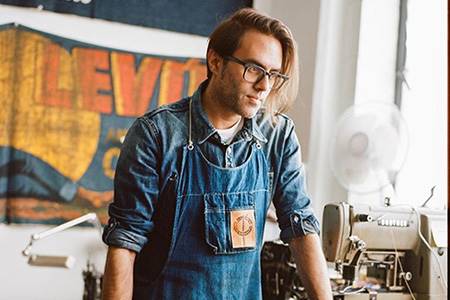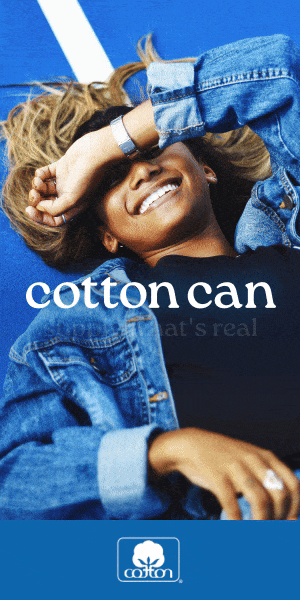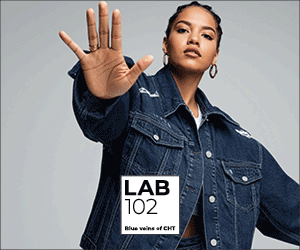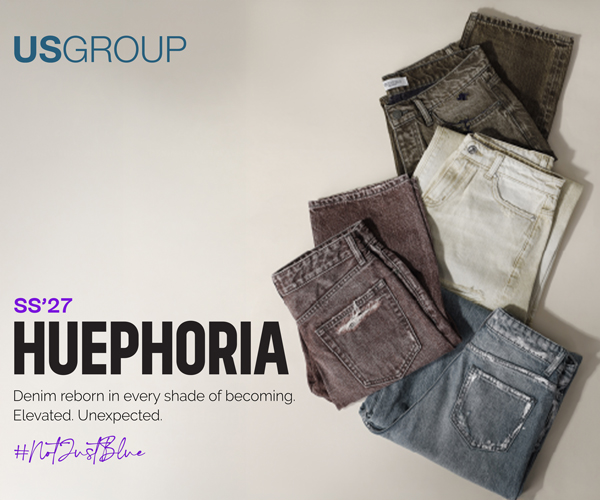Mohsin Sajid: If I’ve helped even one designer become a creative director, I’ve done my job

Mohsin Sajid has worked as a denim designer and consultant for 20 years. In recent years he has added lecturer and tutor to his list of roles. He has worked on industry projects with partners ranging from Candiani, Kaihara, Orta, Atlantic Mills and Cone Denim, plus suppliers such as Lenzing, Jeanologia and YKK. He tells us how his work has adapted to life online and how denim’s rich history and innovative outlook give him the tools to inspire fresh generations of designers.
The sixth Ravensbourne University London x Kingpins Show Denim Innovation Project recently concluded. Can you briefly tell us what it’s about and how it went?
I can confidently say it’s one of the best industry-focused educational denim projects ever created. I’ve worked at 15 different fashion universities – there’s nothing else like this. The project is now in its sixth year. It tasks year-two students from three courses to collaborate and create a denim brand from start to finish in 10 weeks. The 2020/21 year group’s focus was on sustainability and denim mills from around the globe sponsored the project with their most sustainable fabrics, as well as YKK for trims, Crafil for thread and Landes for leather patches.
The project started in mid-October at Transformers. The students heard 30 short lectures from denim industry figures and supply chain partners. Then, each of the groups had to design a collection (research, pattern-cutting, sewing), do correct costing, understand each of the denim mills, pick fabrics, work out where they would make the collection (as if they were a real brand), work out a retail model for the collection, find a store that might buy the collection, then create a marketing story, photoshoot and social media campaign. It was an intense 10 weeks.
Of course, this year the entire project was held on Zoom as the students could not meet in person. If anything, it was the best in the six years we have been doing the project because we had the most engagement from the students. Ravensbourne University London held an industry judging event on January 29 to decide winners in six categories.
You have worked as a designer and consultant to brands and mills. What aspect do you enjoy working on most and how do you develop your knowledge?
For the first 10 years of my career I worked exclusively for brands, as a senior designer and director. That’s how I cut my teeth. But for the last eight years I’ve been a consultant for brands and denim mills while I started my own brand, Endrime. I’ve enjoyed being a consultant more. I love working across a number of projects at the same time, as well as educational work, which I feel very strongly about.
The fun part about being a consultant is still designing, but not having to worry about sales. You get to work and develop fabrics from scratch, design suitable styles that fit the fabric and, most of all, show off the fabric in the best possible way. But the best part is that I get to influence the market.
For the last five years I’ve been advocator for hemp in denim production. I’ve held a number of high-profile webinars and workshops on the subject and convinced many mills to develop it. It’s been amazing that it’s finally being recognised as one of the most sustainable natural fibres for denim use. For the past 12 months I have been developing a collection with Naveena Denim, based in Lahore, Pakistan. This collection will be the most advanced hemp collection to date. We hope to release it at the April 2021 Kingpins Show.
How you gain knowledge is pretty much not being fazed by a job spec, but by being an all-rounder and knowing the supply chain. Knowing your limits. I’m lucky as I know how to design, pattern cut and sew - my wife Sadia is a graphic designer and filmmaker - so we are a great team and, most of all, enjoy it.
I’ve also gained knowledge from the 1,000-plus vintage denim and workwear garments I’ve collected, which has helped me to understand older construction methods. I now have 27 vintage sewing-machines in the Endrime studio, often because I’ve wanted to learn about older tailored constructions. I love the smallest detail, from a certain, old-type circle-bar tack or a stitch that is not possible any more. I have written countless blogs about sewing machines.
You have also worked as an educator for many years, through teaching at universities and through workshops, and via Kingpins Transformers.
I’ve really been a champion of denim education for the last 16 years. For the last six years, denim education has turned into something else. For me, the interest is in raising the next generation of denim designers and setting up MA and PhD denim-focused courses at The Royal College of Art. Also, my work and association with Kingpins Show and Transformers Foundation has been a tipping-point for me. From 2019 I have been the main organiser and host of educational conference Transformers: ED, inviting and interviewing speakers and hosting Q&As from students from all around the world.
We created this after Kingpins founder, Andrew Olah, came to one of my educational events in London. It’s been mind-blowing how big it’s all become. Last time, more than 50 fashion universities took part and we did it across three days with 30 speakers, with 500 to 700 students attending.
What’s your favourite thing about teaching young people, and are there any particular success stories that stand out?
My job is to open their eyes to constructions and history. It’s a joy to watch and mentor and champion the best. I show them historical samples, then encourage them. If I’ve helped even one designer go on to become the creative director of a company, I’ve done my job.
There have been a number of amazing students over the years, but there are two stand-outs. In 2015, Hannah Jenkins won a £50,000 H+M design award for her Kaihara selvedge denim collection. Then, in 2020, Danielle Elsener won the Evian design grant of £50,000 for her zero-waste denim selvedge collection, also from Kaihara selvedge.
What parts of the denim ‘curriculum’ are you particularly passionate about?
I personally love lecturing about denim history. I have an eight-hour mega-class I start with. There are more than 30 videos: denim history, birth of the blue jean, key historical brands and their input in denim and workwear today. The new denim renaissance, cotton, yarn and denim manufacturing processes also feature, as do natural indigo versus synthetic indigo, denim terminologies, the strengths of using original shuttle-looms, different weaves and different thicknesses.Washing and sustainable finishing is a subject I also enjoying lecturing about, as it changes every few months, so it’s great to give up-to-date knowledge to the students. I also enjoy the branding and identity lectures I create. We will look at historical brands, how they marketed their jeans compared to the modern brands of today.
How has the education sector altered since the pandemic began and how have you adapted? Have you sensed any hesitancy from young people about working in the industry because of the pandemic?
Actually, I’ve found teaching over Zoom not as bad as most. We have planned all our lectures very well, with 15 mins per student each session. Of course, showing a real vintage garment compared to an image on a screen does not compare. The practical sewing classes I teach have been parked. I’ve now filmed myself in every step and plan to do a live six-hour session with a few GoPros strapped to my head in my studio.
I’ve found most of the students have got better at presenting as a result and their confidence has grown throughout the pandemic as they have to share their work digitally and explain. Most of students are currently panicking about their gap year, as many have not found placements yet due to covid.
What are your plans for this year and what should we look out for?
There are number of exciting projects we are already busy on many which I cannot say much about because of non-disclosure agreements. But one your readers might want to look out for is Tencel x Endrime x NDL. It’s a hemp collection called Bast Recast. It’s been a year in the making. We have designed the entire collection from the fabrics to garments from the ground up. We can't wait to show everyone. Everything about the collection is groundbreaking, even down to what we did with the waste.
I would also highlight the Tencel and Carved In Blue podcast series and webinars, with many interesting interviews with figures from the denim industry. These are hosted by Tricia Carey and Michael Kininmonth, with production and organisation by Endrime. There is also the Transformers ED April edition with another set of 20-plus industry speakers, and the Central St Martins denim project, with 25 menswear students plus five denim mills. A final one to mention is the Tencel and Carved in Blue ‘Blue Lenz’ project, a really big one.













